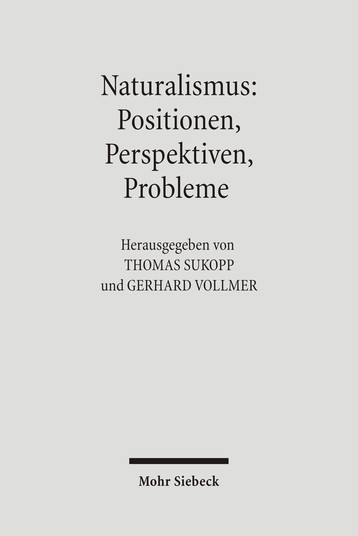Theology
Naturalismus: Positionen, Perspektiven, Probleme
Hrsg. v. Thomas Sukopp u. Gerhard Vollmer
[Naturalism: Positions, Perspectives, Problems.]
2007. XI, 207 pages.
64,00 €
including VAT
including VAT
sewn paper
ISBN 978-3-16-149380-5
available
Published in German.
The debate on naturalism marks a watershed in analytically oriented epistemology and the philosophy of science. In this work, the authors deal with some of the main topics of contemporary theoretical philosophy. How closely are epistemological methods related to scientific methods? Is knowledge a natural phenomenon as Kornblith suggests? Does naturalism solve ontological problems as it claims to do? Are the more ambitious versions of naturalism incompatible? In this transatlantic cooperation, each article (among them essays by Hilary Putnam, Hilary Kornblith and John R. Searle) is commented on by other philosophers and then defended by the author. This concept makes it possible to detect controversies, since both naturalistic philosophers and their opponents have their say. This book will be challenging and rewarding reading for scholars as well as for interested laymen.Survey of contents
Thomas Sukopp: Naturalismus in der gegenwärtigen Erkenntnistheorie: Ein ÜberblickHilary Putnam: Gehalt und Attraktivität des »Naturalismus« – Bertold Schweitzer: Anti-Naturalismus als seltsamer Attraktor: Kommentar zu Hilary Putnam, »Gehalt und Attraktivität des ,Naturalismus'« – Hilary Putnam: Antwort auf Bertold Schweitzer
Dirk Koppelberg: Normative versus naturalistische Erkenntnistheorie – ein unüberbrückbarer Gegensatz? – Wolfgang Buschlinger: Was sind und was sollen epistemische Werte? Replik auf »Normative versus naturalistische Erkenntnistheorie – ein unüberbrückbarer Gegensatz?« von Dirk Koppelberg – Dirk Koppelberg: Naturalismus und Normativität: Replik auf Wolfgang Buschlinger
John R. Searle: Biologischer Naturalismus – Henrik Walter: Kommentar zu John R. Searle: »Biologischer Naturalismus« – John R. Searle: Ein Versuch, Dinge deutlich zu machen: Replik auf Henrik Walter
Hilary Kornblith: Wissen: Ein natürliches Phänomen – Martin Kusch: Überzeugungen, Kategorien und Regeln: Ein Kommentar zu Kornbliths »Knowledge and its Place in Nature« – Hilary Kornblith: Replik auf Martin Kusch
Martin Mahner: Kann man als metaphysischer Naturalist zugleich erkenntnistheoretischer Naturalist sein? – Bernulf Kanitscheider: Kommentar zu Martin Mahners Aufsatz »Kann man als metaphysischer Naturalist zugleich erkenntnistheoretischer Naturalist sein?« – Franz Josef Wetz: Naturalismus gegen Naturalismus: Kommentar zu Martin Mahners Aufsatz »Kann man als metaphysischer Naturalist zugleich erkenntnistheoretischer Naturalist sein?« – Martin Mahner: Replik auf die Kommentare von Bernulf Kanitscheider und Franz Josef Wetz
Olaf L. Müller: Jenseits: Eine metaphysische Provokation für Naturalisten – Thomas Sukopp: »Schwer von Begriff?« Von ausgepackten Metaphern und Jenseits-Analogien – Ein Kommentar zu Olaf L. Müllers metaphysischer Provokation – Olaf L. Müller: Wo spielt die mentale Begleitmusik? Plädoyer für das Eingeständnis einer profunden Unwissenheit – Antwort auf Thomas Sukopp
